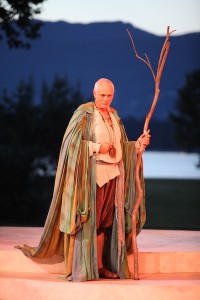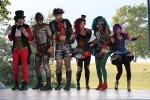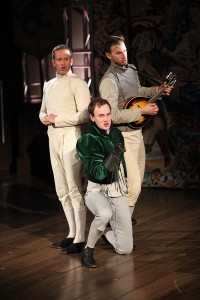From left to right, Anousha Alamian, Shawn Macdonald and Anton Lipovetsky in Equivocation. (photo by David Blue)
From Midsummer Night’s Dream and Cymbeline, reviewed last month, the Independent moves to Bard on the Beach’s other two offerings this season: The Tempest and Equivocation.
There is only one word to describe this production of The Tempest: fantastic. It is a remounting of the 2008 show, which debuted on the studio stage under the direction of Meg Roe. That was a sublime production and I did not think it could get any better. But, I was wrong. Roe’s second time around, with the move to the big stage, has elevated this “storm” to new heights and makes it the must-see show of the Bard quartet.
Allan Morgan and Jennifer Lines reprise their 2008 roles, as Prospero and Ariel, respectively. Six years on, both have gained a maturity that infuses their acting and takes them to the top of their games. It is their relationship that is very much front and centre in this tale. Morgan is a stern but loving father and, ultimately, a benevolent Prospero, and Lines, with her lovely singing voice, is a charming Ariel, Prospero’s fairy servant.

Todd Thomson’s portrayal of the leashed, animal-like slave Caliban is visceral, as he evolves from crawling subjugation to upright manhood. Miranda’s (Lily Beaudoin) and Ferdinand’s (Daniel Doheny) innocent young love is so touchingly portrayed that even the heart of the biggest cynic in the audience will melt. However, it is Luisa Jojic and Naomi Wright, as the tippling sisters Trincula and Stephana, who blast this production into the stratosphere. Their metamorphosis from sophisticated, well-heeled ladies to bedraggled strumpets, as they troll the island with Thomson (with whom Wright gives new meaning to the concept of a foot fetish) and their funky pas de deux are worth the price of admission. This comedy is juxtaposed against the darker side of the production, Prospero’s struggle – enslavement or freedom, revenge or forgiveness, love or hate.
As in Midsummer, the visuals give this production its moxie: the seashell stage frame, Christine Reimer’s fabulous costumes (Ariel’s gigantic wings, First Nations-inspired raven masks, creatures on stilts with flowing robes, white-frocked cross-dressers) and Gerald King’s lighting, especially for the sparkly wedding scene. Add to the mix original music (composed by Roe’s husband, Alessandro Juliani) played by a string quartet prominently seated on stage and you have a recipe for success. There are Jessies on the horizon for this production. As Prospero says in his iconic line, “We are such stuff as dreams are made on.” And this dream has wings.
For the Shakespeare, history and political buffs out there, Equivocation will provide a cerebral workout and, with its plain language, a respite from the Bard’s iambic pentameter.
While Shakespeare was a prolific writer, little is known about the man himself. Bill Cain, a Jesuit priest and founder of the Boston Shakespeare Company, takes up the gauntlet to provide us with some insights into Shakespeare’s character in this thought-provoking play set in 1606 and centred around the Gunpowder Plot to blow up Parliament and assassinate King James I and his family.
The plan foiled and the conspirators sentenced to death, Prime Minister Robert Cecil approaches “Shagspeare” to write the government’s version of what happened. Shag is conflicted (as he says, “I don’t do current events”) about whether to write his patron’s propaganda or tell the truth, at great risk to himself and his merry group of thespians, the King’s Men. To equivocate – use unclear language to deceive or mislead – or not to equivocate, that becomes the question.
Shag’s decision process and his troupe’s rehearsals weave their way through other storylines: the strained relationship between Shag and his daughter, Judith, the surviving twin (his son, Hamnet, died at the age of 11) and the rivalry between the two acting Richards, veteran Burbage and young Sharpe.
Cain teases us with multiple references to Shakespeare’s works (so brush up on your Shakespeare before seeing this!), along with plays within a play (a much-loved Bard device) and some spicy, contemporary language. Oh, and there are a couple of beheadings, too.
Six actors comprise the cast and all but Shag (Bob Frazer) and his daughter Judith (Rachel Cairns) play multiple roles.
Gerry Mackay is Burbage as well as Garnet, the Jesuit priest and the alleged mastermind behind the plot, who defines equivocation as, “a way to tell the truth in difficult times.” Jewish community member Anton Lipovetsky shines in his two major roles of a co-conspirator and the wacky King James (played with a darn good Scottish accent). Anousha Alamian creeps us out as the Machiavellian Cecil and Shawn Macdonald does Armin and Sir Edward Coke, along with a lovely Lady Macbeth. The whole cast is strong, seamlessly moving in and out of their various roles and this is very much an ensemble success story (ably directed by Michael Shamata) but particular mention must be made of the performances of Frazer, Mackay and Lipovetsky.
The set is stark and the costumes simple. The only time color really appears on stage, apart from the language, is during Macbeth, in which the actors are resplendent in colorful plaid shawls. This color versus black and white juxtaposition is a metaphor for Shag’s conundrum, to tell the truth or to color it. And, by the way, what is truth?
Tova Kornfeld is a Vancouver freelance writer and lawyer.



